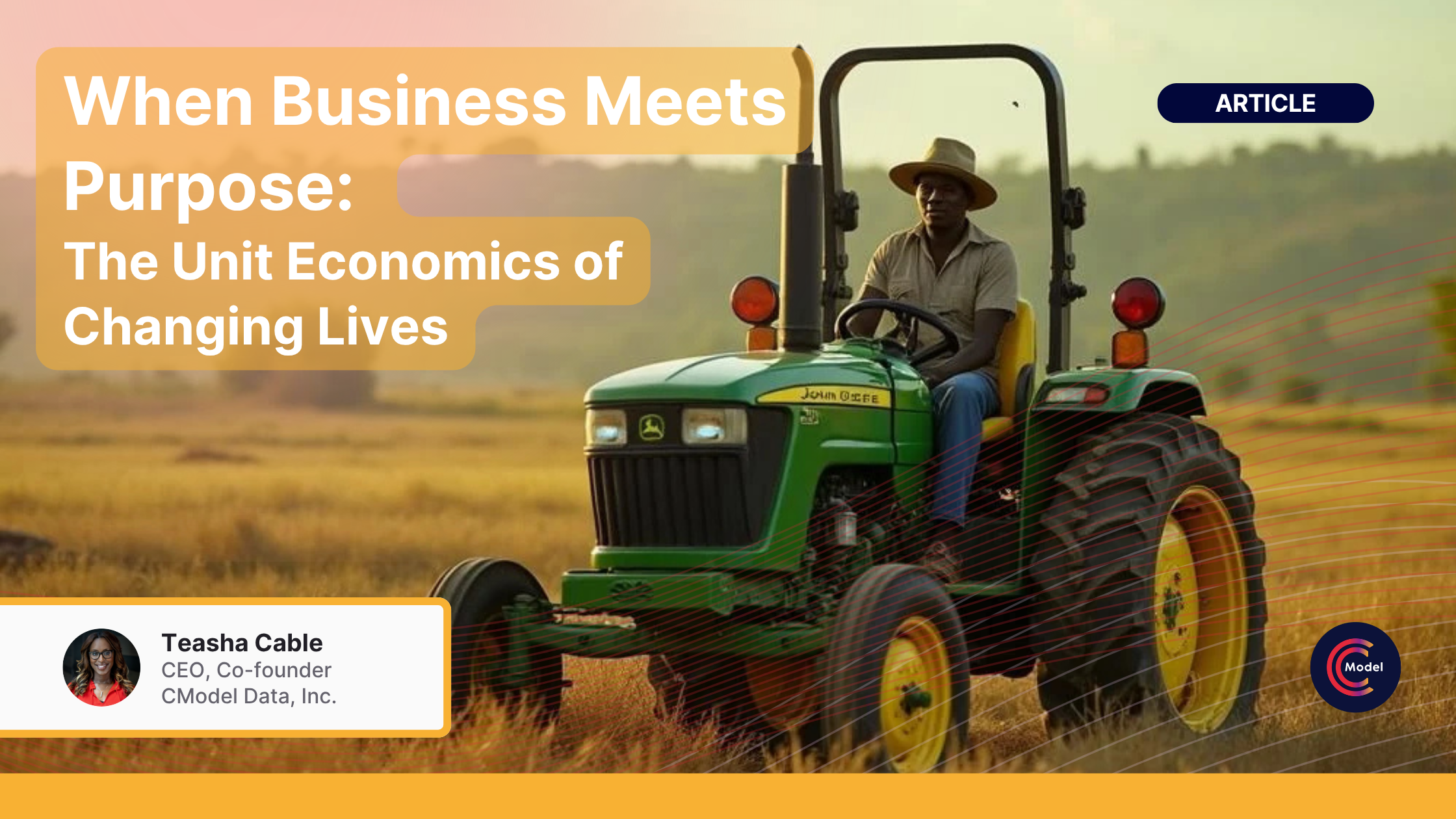

I had the pleasure of hosting Jehiel Oliver CEO of Hello Tractor on the #DynamicDecisionsPodcast. What started as a conversation about agricultural technology turned into something much deeper—a masterclass in purpose-driven decision making that left me with pages of notes—and a renewed appreciation for leaders who truly understand their mission.
Picture this: You're a smallholder farmer in Kenya. You've got maybe five acres to work with, but you can't afford the $40,000 tractor that could transform your productivity. Meanwhile, there's a tractor owner in your area whose equipment sits idle most of the season because he can't find enough work to make it profitable.
Think Uber, but for tractors
This is the exact gap that Jehiel saw ten years ago when he left his finance career to tackle something more meaningful. His solution? Think Uber, but for tractors. Hello Tractor connects farmers who need equipment with tractor owners who have it, creating a win-win that's now serving millions of farmers across 18 countries in Africa.
Here's where Jehiel's story gets really interesting. When your average farmer is in their mid-to-late fifties and might not be the most tech-savvy person around (as he hilariously pointed out, his mom still calls him from Cleveland asking him to order an Uber from 5,000 miles away), you can't just build an app and expect adoption.
You can't just build an app and expect adoption.
Instead of forcing farmers to come to the technology, Hello Tractor took the technology to them through community agents—typically younger people who already had trust networks in farming communities. These agents became the bridge, handling the digital booking while maintaining the human connection that makes everything work.
The genius isn't just in the model—it's in understanding your customer so deeply that you can design around their reality, not your assumptions.
What struck me most about our conversation was how disciplined Jehiel is about unit economics. Unlike companies that can raise rounds of investment to "pay for mistakes," Hello Tractor operates in resource-constrained markets where every decision has to make financial sense.
"We look always at what are the unit economics of a decision. We can't afford to lose money."
This isn't just about being profitable—it's about sustainability. When you're serving low-income farmers, you can't build a business model that depends on external subsidies forever. The work has to pay for itself, or it can't scale.
They've even shut down operations in markets and discontinued products when the economics didn't work. That takes serious discipline, especially when you genuinely care about the impact you're creating.
The metrics Hello Tractor tracks tell the story of a company that understands both sides of its marketplace:
What I love about this framework is how it applies beyond agriculture. Any two-sided marketplace should be thinking about productivity and income on one side, utilization and engagement on the other.
Running a team of 115 people means you know everyone personally. It also means that when someone isn't performing, you can't hide behind corporate anonymity. Jehiel was refreshingly honest about this challenge:
"Personalities get set aside... I can look at your performance and say, 'Hey, we're friends, and you don't have to go home, but you got to get out of here.'"
This is where having data-driven performance management (they use OKRs) becomes crucial. When you have to make tough personnel decisions, being able to point to concrete metrics rather than gut feelings makes the conversation more fair and less personal.
One of my favorite parts of our conversation was when Jehiel talked about hiring. He actively looks for people with unconventional backgrounds—those who've overcome obstacles to get where they are, rather than those who followed a predictable path.
"You find people where they have very unconventional journeys and they've overcome so much... You're like, wow, you're an impressive person. You've already lapped that person who was given everything and is just doing OK."
In markets where talent is abundant but opportunity isn't evenly distributed, this approach has helped Hello Tractor build a team that consistently outperforms expectations.
I ended our conversation with my favorite exercise—the decision-making persona assessment. Jehiel came out as 40% feeler (gut instinct and empathy), 40% planner (using past insights to inform strategy), 15% data driver, and 5% counter.
What's interesting is that he immediately identified team members who fill in his gaps. His number two is heavy on the analytical side, and his former co-founder (his wife) was a "counter"—someone who deeply analyzes lessons learned from past decisions.
The best leaders don't try to be everything. They know their strengths and surround themselves with people who complement them.
When I asked Jehiel for advice for aspiring leaders in the sector, his answer was perfect:
"Be self-aware, confident in your convictions, and take your time."
Agriculture is a slow industry. Farmers get maybe 40 seasons in their career, so they can't afford to make mistakes. If you're building for them, you need to approach your business with the same careful deliberation.
You also need conviction about something deeper than money. Because this work is hard, and when things get difficult (and they will), you need fuel that goes beyond financial returns.
Jehiel's story isn't just about tractors or agriculture. It's about what happens when you combine deep customer understanding, financial discipline, and genuine purpose. It's about building something that creates value for everyone in the system, not just the company.
What happens when you combine deep customer understanding and financial discipline?
In a world full of companies trying to "disrupt" industries they don't understand, Hello Tractor offers a different model: Listen deeply, solve real problems, build sustainably, and measure what actually matters.
That's not just good business. That's the kind of leadership we need more of.
You can hear the full conversation with Jehiel Oliver on the Dynamic Decisions Podcast. And if you're curious about your own decision-making style, check out our organizational decision dynamics assessment—it's been eye-opening for the teams who've tried it.
